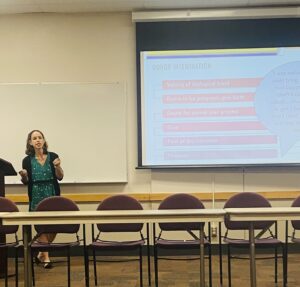Ethics in Clinical Psychology
(Graduate Seminar)
Course description: This course will address a range of ethical issues faced by clinical psychologists. Among the questions that we will grapple with are, What constitutes confidentiality in therapeutic relationships? How do the ethical guidelines regarding confidentiality differ for adults versus minors? What is the duty to warn and when is it necessary? What are common ethical dilemmas in the initiation and termination of therapeutic relationships with mental health consumers? What are the tensions between ethical standards in clinical research versus clinical practice?
Human Sexuality
(Undergraduate course)
Course description: This course examines contemporary knowledge and attitudes about human sexuality, relying on theoretical and empirical psychological research. Multiple perspectives are presented, including psychosocial, cross-cultural, and psychobiological. Sexuality across the life span is examined, including issues pertaining to: biological sexual differentiation, the sexual response cycle, intimacy and communication, varieties of sexual relationships and behavior, and sexually transmitted diseases and HIV. Emphasis is placed on the critical analysis and synthesis of research on sexuality in the context of current social and cultural influences.
perspectives are presented, including psychosocial, cross-cultural, and psychobiological. Sexuality across the life span is examined, including issues pertaining to: biological sexual differentiation, the sexual response cycle, intimacy and communication, varieties of sexual relationships and behavior, and sexually transmitted diseases and HIV. Emphasis is placed on the critical analysis and synthesis of research on sexuality in the context of current social and cultural influences.
The Psychology of Sexual Orientation
(Undergraduate First Seminar)
Course description: This course takes an intersectional, life course approach to the topic of sexual orientation, attending to the various social locations that intersect with sexual orientation (e.g., gender, race) and the shifting nature and meaning of sexual orientation at different stages of development. Topics covered include: the history and politics of sexual orientation research; “compulsive heterosexuality” and the construction of masculinity and femininity; sexual identity development and sexual fluidity across the life course; intersections among sexual orientation and gender identity; intimate relationship dynamics and family-building in LGBTQ communities; LGBTQ aging issues; and tensions and conflicts surrounding LGBTQ activism and advocacy.
Research in Diverse Families and Sexualities
(Undergraduate Research Course)
Course description: This course involves undergraduates in all phases of ongoing research being conducted in the Diverse Families Laboratory of Professor Abbie Goldberg. Current projects include the Transition to Adoptive Parenthood Project and the Lesbian Parents Project. Students will participate in weekly lab meetings. Depending on the phase that studies being conducted in the lab, students can be involved in project design, recruiting participants, transcribing participant interviews, coding data, managing data and library research.
True Crime: Gender, Race, and Sexuality as Lenses
(Undergraduate First Seminar)
Course description: This course focuses on the role of gender, sexuality, and race-and their intersections-in the reality and (mis)representation of crime. This course seizes on the accelerating and persistent cultural fascination with true crime, as made evident by the recent explosion in true crime media, including documentaries and podcasts. Blending critical readings, empirical research, pop culture, and media analysis, and drawing from multiple disciplines, it assumes an intersectional lens to consider why true crime is so popular as a genre, and with whom. We will examine true crime stories, which will be used to explore issues related to stigma, visibility, violence, sexuality, and intersectionality, as well as the relationship between agency (i.e., the individual) and social structures and systems (e.g., the legal system). We will center gender, race, sexuality, and class in examining both the reality and representation of true crime-for example, research on, narratives about, and media representations of missing children, trans women murders, and women serial killers. In this way, we will consider offending and victimology (e.g., why do women kill?) as well as ideas about and representations of female murderers (e.g., White women like Amanda Knox are positioned as “femme fatales”). In exploring true crime cases, we will take stock of not only who and what highlighted in crime, but what is invisible in the accounting, representation, or societal focus surrounding the case. Dominant media narratives can impact how jury members, policy makers, and the general public view women, people of color, and LGBTQ people; in turn, we also consider the individual and societal impacts of true crime and its representation.
Contemporary Families: Theories, Research, and Controversies
(Undergraduate Capstone Seminar)
Course description: The goal of this seminar is to engage students in the major theories, empirical research, and current controversies on contemporary families. This seminar will examine the varied contextual forces and social locations that are fundamentally intertwined with, and serve to shape, family life (e.g., race, social class), as well as the many forms that contemporary families take (e.g., single-parent families, gay-parent families, adoptive families). Special attention is paid to timely but understudied topics related to family life, such as the influence of reproductive technologies (e.g., donor insemination) and information technologies and social media (e.g., text messaging, the internet) on family life. This course will also emphasize the major theoretical perspectives that have been used to understand and theorize about families.